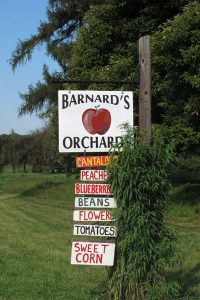As expected, The Land Conservancy for Southern Chester County announced on Wednesday, Aug. 31, that the funds needed to preserve Barnard’s Orchard in Newlin Township for future generations have been raised.

An announcement from the conservancy said that in just one short month, the community came together to support the $901,000 initiative.
“We would like to give a giant thank you to all of those who donated or pledged gifts and spread the word,” the announcement said. “We could not have gotten this far without you.”
The funding gap closed this past weekend when Brandywine in White, a pop-up gala held to benefit area nonprofits, helped TLC reach its target. This year’s event was held at Chadds Peak Farm in Pennsbury Township.
“With over 350 tickets sold, this beautiful event was the final push we needed,” the announcement said, expressing special gratitude to its organizers: Elizabeth Roche and Vince Moro.
The Land Conservancy for Southern Chester County (TLC) worked with the Barnard family to place an agricultural conservation easement on the 74-acre, family property, which was established in 1862 and has become a community mainstay through its orchard and farm store. Conserving the property will ensure that the lands remain in active agriculture in perpetuity and eliminate the possibility of future development, the announcement said.
Gwen Lacy, TLC's executive director, applauded the news. But she also pointed out that more work needs to be done. She said several other area farms are currently threatened by development, and she hope the momentum would continue. To learn more, visit http://tlcforscc.org.

Those who applaud this restriction on the use of land should read and contemplate Frederic Bastiat’s 19th century essay “That which is seen, and that which is not seen.” What is not seen are the families who will not be able to purchase the home of their dreams, the many (perhaps thousands) of workers who will not earn a living constructing the homes, building the many tools and machines required to construct the homes, extracting the minerals and processing the lumber and all other materials. Also consider the taxes that will not be collected, which means that the rest of us must pay higher taxes to support government. The list goes on and on.